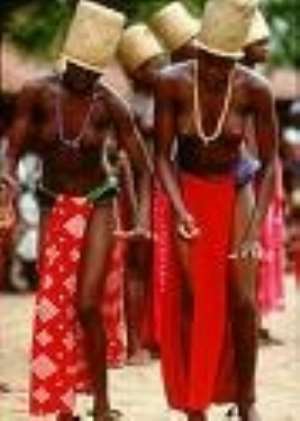
Dipo, the century-old puberty rites for girls of Krobo descent, is currently undergoing some major transformation with the fixing of the minimum age at 12 for all girls who qualify to go through the rite.
The exposure of the breasts and other parts of the body of the dipo girls during the period of confinement is also being discouraged.
Explaining the rationale behind the decision in a chat with The Mirror, Co-ordinator of the Manya Krobo Queen Mothers Association, Manye Nartekie, said the exposure put the girls at risk because some lustful men took advantage of these girls after the initiation.
Additionally, the practice of taking the girls round the marketplace and other conspicuous locations in town has been discouraged. Parents have been encouraged to let their daughters return to school immediately the rites are over.
Another innovation is the participation of the queen mothers and the district health team at the graduation ceremonies of these girls when they receive further education on personal hygiene, fidelity, cookery, herbal care, home management as well as education on HIV/AIDS.
According to Manye Nartekie, the ultimate aim of the custom is to make the girls aware of what takes place while in confinement and guide them as they grow into adulthood.
These major reforms of the foremost Krobo custom is expected to make dipo more acceptable to Christians and non-Christians alike and equip the teenage girls who go through the rites with the requisite skills and training, thus adding value to their personality.
This initiative, spearheaded by the Manya Krobo Queen Mothers Association (MKQA), after consultations with the 13 dipo priests in the Manya Krobo Traditional Area, has the support of the district health team.
Manye Nartekie said that previously dipo was aimed at providing informal training for the girls to enable them to cater for the family when they eventually got married.
However, according to Manye Nartekie, this informal training became outdated with the passage of time, which made it difficult for the Krobo women without formal education to fit into the working society and adequately generate income to support the family.
She explained that previously it was the responsibility of the men to work single-handedly to feed the family.
Manye Nartekie admitted that because of changing trends globally it had become imperative for women to work to supplement the income of their husbands.
She said as a result of this development, the MKQA found it necessary to encourage young Krobo girls to have formal education and also go through the puberty rites.
Manye Naterkie added that since the modernisation of dipo started some five years ago there had been positive results and that almost everybody had embraced the changes.
She called on Krobos all over Ghana and beyond to accept the modification so that “our culture does not become extinct”.
Already, dipo has started in some divisions of the traditional area and will get to its peak during the Easter festivities.
Later, The Mirror met Nene Klamersi, the Hwekper Dipo Worno and Nene Asikpe Larm, the Klowerki Seyelor and his Secretary, Mr E. A. Appiah, who said they (the dipo priests) had agreed to accept the reforms in order to make dipo acceptable to all irrespective of one's religious beliefs.
They, however, complained about the age limit of 12 set for the girls, describing it as a bit worrying and mentioned that they were still negotiating to have the age reduced to about seven or eight years.
The dipo custom is an initiation rites during which groups of young Krobo girls are taken through puberty rites on attaining adolescent age.
However, some parents have devalued the custom to the extent of allowing their children including toddlers to go through the rites.




 Meta releases new version of conversational AI across its platforms
Meta releases new version of conversational AI across its platforms
 Cape Town named Africa’s Best Airport 2024 by Skytrax
Cape Town named Africa’s Best Airport 2024 by Skytrax
 Bono East: Four injured after hearse transporting corpse crashes into a truck
Bono East: Four injured after hearse transporting corpse crashes into a truck
 ‘Be courageous, find your voice to defend our democracy’ — Sam Jonah urges journ...
‘Be courageous, find your voice to defend our democracy’ — Sam Jonah urges journ...
 Exodus of doctors, nurses and teachers have worsened because of unserious Akufo-...
Exodus of doctors, nurses and teachers have worsened because of unserious Akufo-...
 2024 election: Avoid insults, cutting down people in search of power – National ...
2024 election: Avoid insults, cutting down people in search of power – National ...
 ‘You passed through the back door but congratulations’ — Atubiga on Prof Jane Na...
‘You passed through the back door but congratulations’ — Atubiga on Prof Jane Na...
 Government’s $21.1 billion added to the stock of public debt has been spent judi...
Government’s $21.1 billion added to the stock of public debt has been spent judi...
 Akufo-Addo will soon relocate Mahama’s Ridge Hospital to Kumasi for recommission...
Akufo-Addo will soon relocate Mahama’s Ridge Hospital to Kumasi for recommission...
 We must not compromise on our defence of national interest; this is the time to ...
We must not compromise on our defence of national interest; this is the time to ...
